|
FAQs about Acroporid Coral Social Disease
FAQs on Acroporid Disease:
Acroporid Disease 1, Acroporid Disease 2, Acroporid Disease 3, Acroporid Disease/Pests/Predators
4, Acroporid Health
5, Acroporid Health
6, Acroporid Health
7, Acroporid Hlth.
8, Acroporid
Hlth. 9, Acroporid Hlth. 10,
FAQs on Acroporid Disease by Category:
Diagnosing,
Environmental (Pollution/Poisoning, Lighting...),
Nutritional, Trauma,
Pathogenic (Infectious, Parasitic, Viral)
Predatory/Pest
(see below), Treatments
FAQs on Pests of Acroporids:
Montipora Munching Nudibranchs,
Flatworms,
Red/Black "Bugs"
Acropora Munching Copepods,
Related Articles: Coral Pests and Disease; pests, predators,
diseases and conditions by Sara Mavinkurve, Acroporids, SPS
Corals,
FAQs on Stony Coral Disease by Type: Brown Jelly Disease, RTN,
|
Easily lose to more stinging stony corals, many soft
corals, even gorgonians, Anemones...
|
Forest fire digi and red digi 12/9/17
I have these two corals amongst many other and all of a sudden it is having
major effect to light.
<Interesting syntax>
I have been running 6 bulb t5 with two Reefbrite strips for a year now. Last
two days the coral looks completely fine and the lights come on the polyps
recede and it almost looks like it’s bleaching. I have multiple colonies of
the corals from sand bed to top of the tank and all have same effect. Weird
thing is my blue digi and many other sps and lps corals are great.
<Perhaps a clue>
No pest that I can see. I did a water change and started running activated
carbon with no change. I’m stumped all parameters are stable checked and re
checked! Any insight would be grateful thanks!
<What are the other coral/Cnidarian species here? Bob Fenner>
Re: Forest fire digi and red digi 12/11/17
I have lots of other sps Acropora millipora lots of Zoas and Palys and a
fair amount of lps torches hammers octospawn etc.
<Ahh, the Acroporas are fine w/ Montiporas, but the Zoanthids...
Euphyllias... are very likely mal-affecting your digitatas... You could try
chemical filtrants (e.g. ChemiPure, Polyfilter), raising your RedOx (via
ozone best)... or moving them elsewhere, to another established system. I'd
have you read on WWM, using the separate terms "Cascade event" and
"allelopathy". Bob Fenner>
Re: Forest fire digi and red digi 12/11/17
Thanks
<Welcome Justin. B>
|
Struggling with SPS 7/21/2009
I am a long time SPS keeper and have a great deal of success over
the years
- until now. I setup a 1000L tank approximately 9 months ago
(from the stock
in my 4x2x2) and have seen a progressive slide in the health of
my corals over recent months. I have provided my tank details at
the bottom of the message and also attached a photo showing one
of my corals. It is hard to describe but the corals are showing
signs of mucus production, minor recession of the tissue, a
mould/fungus like covering. This appears to be affecting older
parts of the colonies more than new growth. None of my LPS are
showing any signs of stress in fact a recent bit of damage to an
elegance healed up nicely in two weeks without an issue.
<Perhaps a clue>
I am at a loss. I thought I had a fairly well setup tank but I am
now considering pulling it down as I cant get on top of the
issue. Thank you for any help you can provide.
http://i88.photobucket.com/albums/k179/kirsto71/New%20Tank/P5100027.jpg
System Type: Mixed Reef
Display System:
Strike up Date: Oct 2008
Display Tank: 6 x 3 x 26inch. Cross braced and euro braced
Display Lighting: 3 x 250w MH. IceCap Electronic ballasts and
Lumen Bright reflectors 20k bulbs
Stand: 50x50 Galv Steel
Hood: 50x50 RHS
Sump: 110x60x45 cm Sump
Refugium: Compartmentalized in sump
Refugium Lighting: 2 x Double HO-T5's 10k bulbs
Support systems:
System Water: NSW
<Another set of possibilities>
Display Water circulation: 2 x Iwaki MD70's driving eductors
in closed loop format, 1 x 15000 LPH closed loop pump through
base of tank, Tunze Wavebox, 2 x 6000 LPH Koralia copies plus
waiting to order a Vortech Return Pump: Laguna 11000 LPH
Skimmer: Turbo 1200mm Tall Recirculating Beckett Skimmer driven
by a 7200
LPH pump
Evaporation Top Up: Iwaki dosing pump controlled by
Aquatronica
System Control: Aquatronica. Controls:
Auto water change (15 L per day)
Metal halides
HO-T5 lighting
Calcium reactor
Top Off
Water leak sensor
Chiller
Monitors - RedOx and pH
Chemical Support:
Calcium Addition: Turbo Single Stage Calcium Reactor
Alkalinity Addition: Turbo Single Stage Calcium Reactor
Other Chemical Maintenance: Minor additions for calcium and Alk
where there is an imbalance
Current Water Chemistry: Stable, very little variation
pH: 8:00 - 8.3
Alk: 8.5 - 9 dKH
Nitrates/Nitrites: 0
Calcium: 425 - 440ppm
Magnesium: 1200 - 1300ppm
Phosphates: <0.03
Temp: 26 degrees C
<Nothing "jumps out" on your list of gear,
measures... The best guess, and this has no real level of
confidence, is maybe some sort of "cascade event"
from/twixt your Cnidarians... Read here:
http://wetwebmedia.com/cnidcompppt.htm
and the linked files above. Bob Fenner>
|
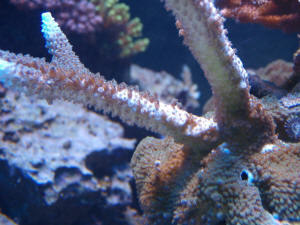 |
|
SPS Burnt Tip Question 4/26/09
Hi Guys,
<Mark>
Can you tell me if the images in link indicate burnt tips?
If not, what could it be?
Tips are bubbling and are soft. Color and Polyp extension look
OK.
Acro:
http://picasaweb.google.com/reef58/4252009?authkey=Gv1sRgCOLm0O2t-9Ckfg#5328689118933044738
<Does appear to be "burnt">
Monti:
http://picasaweb.google.com/reef58/4252009?authkey=Gv1sRgCOLm0O2t-9Ckfg#5328686454499852290
Tank Parameters:
Calc 385
Alk 9.5 dKH
Mag 1400
Lighting is 54 watt T-5 bulbs overdriven with IceCap Ballast.
Not all corals are affected.
Thanks
Mark
<Mmm... the one likely possibility is allelopathy... Please
read here:
http://wetwebmedia.com/cnidcompppt.htm
and the linked files above. Bob Fenner>
|
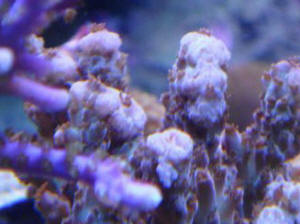 |
|
Re: SPS Burnt Tip Question
4/26/09
Hi Bob,
<Hey Mark>
Chemical warfare, I'll look into it.
<Is one of a few possible guesses at this juncture>
All other corals seem to be fine at the moment.
I also posted on Reef Central SPS forum. Some fellow reefers
experienced the same thing. Nobody has an idea what to label
it.
Consensus was, it's not "Burnt Tips" or RTN/
STN.
A few suggested lowering ALK to around 8?
<Mmm, a good idea... more to the point is the question of how
or what caused your Alkalinity to become so high?>
Thanks for your help.
Mark
<Welcome. BobF>
|
Help with SPS - 05/01/08 Good morning Crew.
<<Evening now 'hello Andy, Eric here>> I hope
you're all doing well. <<Speaking for myself,
yes 'thank you>> I hope you can help me. <<I
shall try>> I have recently started to focus on SPS corals
and am experiencing some problems with a few of my additions. I
have a 110g display (48" x 30" x 18"). Lighting is
2x250W HQI (12,500K and 14,000K--I'm currently experimenting
with bulbs, but haven't made any changes during the time that
these problems arose). <<Okay>> I employ a 30g refugium
with Chaetomorpha (reverse daylight cycle), about 12lbs of LR, and
a 5" DSB. <<Excellent>> My Chaeto grows very
well--I thin it every 2 weeks. <<Mmm, yes 'is doing
as it is intended 'but continuous vigorous growth may
indicate an "excess" of organic compounds. Merely an
observation'¦>> Circulation is 2 x Koralia 3s and 2
x MaxiJet 1200s, plus a Little Giant 1,325 gph return pump.
Filtration is via a wet-dry filter and a Coralife Super Skimmer
that pulls about a cup of dark green skimmate every 2 days or so.
<<Hmm, hard to gauge this output (I do not think much of
these skimmers)>> I run carbon in the sump that I change out
every other week, and I also run a bag of PhosBan in the sump that
I change out every month or so. My numbers are as follows: specific
gravity is 1.0265; ammonia, nitrites, and nitrates are 0 ppm; pH is
a steady 8.3; calcium is 450 ppm; magnesium is 1,125 ppm (a little
low--I'm working on this with Brightwell Aquatics Magnesium-P);
phosphate is somewhere between 0-.015 ppm (Salifert test kit--these
are difficult to read); and alkalinity is 3.5 mEq./L. All
mixing/top-off water is RO/DI with a TDS of 0 ppm. My tank
inhabitants are (I'll leave out the fish, since I don't
think these problems are fish-related): <<I see>> SPS:
1 very nice purple Acro millepora; 1 frag Acropora that my LFS
calls "Marshall Island Acro"; 2 frags purple tipped Acro
(don't know the name 'problem coral--see attached pic
"Acro bleaching.jpg"); 1 very nice piece of Montipora
capricornis or Merulina ampliata (WWM Crew thinks it's a Monti
cap, but others on Reef Central think its Merulina--it does have
1" sweeper tentacles at night--see attached pic "monticap
2.jpg"); <<Note the thin valleys spreading fanwise from
the center'¦I think this might be Merulina
scabricula>> 1 medium Montipora capricornis (problem coral);
1 branching Acro (again. . . ); and 1 neon green tipped Acro (again
. . . see attached pic "neon acro.jpg"). All the SPS are
placed in the upper half of my tank, about 20" from bulb to
coral. <<If they weren't "acclimated" to this
placement under the lighting, this may well be the/part of the
issue>> LPS: 2 Trachyphyllia (maroon and neon green); 1 nice
piece (5 polyps) Caulastrea; and 3-4 polyps Blastomussa merleti
that I had given up for dead but have started to take off. Softies:
2 very nice and thriving Capnella; 1 very nice and thriving
Dendronephthya; 15 or so various Corallimorphs placed throughout
the lower portions of my tank away from LPS and SPS (several green
and purple Rhodactis, one Ricordea, several Green Hairy).
<<Some quite noxious neighbors to the Acroporids>> I
realize that the Corallimorphs are not compatible with the SPS and
LPS. <<Depending on "ratios" 'it can be
managed>> They were my first inverts, and I plan to sell/give
new polyps away as they split. Okay, so here are my problems. Most
of my SPS are doing very well, show full coloration and full polyp
extension, and are growing. I feed them every 3 or so nights with
Eric Borneman's famous fish food and DT's Oyster Eggs.
<<I am a big proponent of feeding your inverts well (and
vertebrate life too!), but you must also take steps to allow for
the added nutrients to the system 'and broadcast feeding
corals adds a LOT of nutrients. I see you employ carbon and
PhosBan, but I would also suggest adding the use of Poly-Filter
with these 'preferably in a small canister filter. I also
think your skimmer is not performing as needed and your tank and
its inhabitants would greatly benefit from an upgrade to a quality
piece of gear>> The two Marshall Island Acro frags, the
polyps of which are fully extended at night, did something very
strange when I introduced them to my display. I drip acclimated
them in my sump for 2.5 hours. They were a deep maroon color, with
a fully encrusted, emerald green base. I placed them in semi-shaded
areas of the tank to minimize any light shock (they were under 400W
SE 20,000K bulbs at the LFS and 108W of 10,000K HO T5s in my QT)
with plans to slowly move them into full light over time.
<<Ah'¦very good>> Within 30 minutes of placing
them in my display, however, the emerald green bases completely
faded and portions of the frag turned a bland cream color.
<<A reaction to your water chemistry and/or noxious chemicals
from the soft corals/Corallimorpharians>> I spoke with my LFS
and it said that this quick fading was really unusual, but I assure
you it did happen. <<I believe you>> As I said, these
frags do have completely extended polyps at night and seem to be
regaining the maroon color they originally had, but I am wondering
why this happened and what I might do in the future to prevent this
from happening. <<Mmm'¦is hard to say for
sure 'but my thought is, a reaction to allelopathy>>
The attached picture shows you what these corals look like now.
<<Yes, I see>> My LFS said it could be subtle
differences in alkalinity between the LFS system and my tanks,
<<Would need to be more than "subtle" I
think 'and even then, not likely with good/slow
acclimation as you describe>> but this even did not happen in
QT so I am leaning towards a conclusion that it is somehow related
to my lighting (although I haven't ruled out possible
allelopathy, but with carbon, good spacing and the fact that my
other SPS are doing well, I don't know about this).
<<Could be any or all these things 'differing
species collected from differing niches of the reef can
react'¦well'¦differently. There is also the
chance these specimens were "already damaged" before you
acquired them>> The second problem is with one of the Monti
caps. I've noticed over the past few days that it is slowly
bleaching from the base up. It is green and cupped, and I lose
about 1/16" of color per 24 hours. <<A bad sign>>
The edges appear to show signs of growth, but obviously something
is amiss. <<Indeed'¦fragging the healthy portion
away from the base is likely in order here>> If you need a
picture, I will send one but I hope/think my description of the
problem should suffice. <<It does>> The other Monti cap
is doing great, has developed deeper, brighter coloring and has
grown about 1/2" since I got it about 1.5 months ago. I was
considering whether an iodine dip using a coral dip product by
Brightwell Aquatics might help, but have read mixed feelings about
such dips here on WWM. <<Can be beneficial as a prophylactic
treatment 'but also has some risk, in my opinion>>
Any thoughts on what is going on with these corals? <<As
stated>> Thanks so much.
Andy
<<Happy to assist. EricR>> |
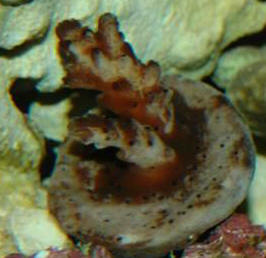 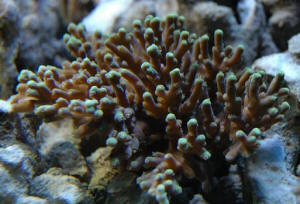 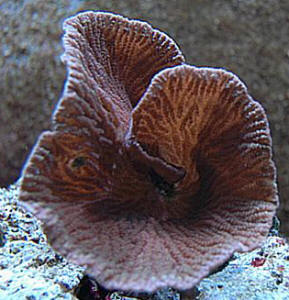 |
Nice SW Sys., too many incomp. Cnid.s
1/16/07 Hi WWM Crew. You've given me great advice in the past.
I hope you can help me now. I'll start with my equipment and
parameters. 75 Gallon mostly SPS 1 Tunze 6100 and 6095 controller
Berlin skimmer rated up to 250 gallons wet dry trickle filter 2 250W
HQI 15K 2 PC Actinic 125W Specific Gravity 1.025 Ammonia 0 Nitrate 0
Nitrite 0 PH 8.4 DKH 11 Calcium 450 2 A.
Millepora 2
Monti Digitata Superman
Monti Spaghetti
Leather Yellow Branching
Porites Galaxea
Acropora Blue
Tort Pavona
Chips
Acropora Turbinaria
Tri Color
Acropora Green
Frogspawn
Pectinia Button
Polyps Pagoda
cup Green
Star Polyps Candy Cane
Coral Orange
Monti Cap Yellow Sun
polyps Pocillopora
Christmas Tree
Coral Chili
Coral Blue ridge
Heliopora Pulsing
Xenias Brown Hairy Mushrooms <Yowzah... a bunch/myriad of competing
Cnidarian species> Blue Hippo Tang 2 Tomato Clowns Blue Damsel Kole
Tang Fairy Wrasse Wow I think that's it. My problem is with my
Superman Monti two parts of it are turning white. I know that's a
bad sign. I have no bleaching on anything else. The Superman
Monti's neighbors were the GSP and Button Polyps would either of
those have anything to do with its color change? <Could very well,
yes> Also my Chili Coral doesn't extend its polyps like it used
to. <This Nephtheid is not easily kept> It is under a ledge
receives little to no light <No problem with the lack of light
here... is non-photosynthetic> and has great flow. If you have any
advice or suggestions on either of these problems please help. Thanks
again guys. Omar <Time to move some of these colonies really...
there is too much really non-compatible life types crammed in here...
Please read: http://wetwebmedia.com/cnidcomp2faq.htm
and the linked files above. Bob Fenner>
Chemical Warfare? 4/6/06 I mentioned in my
last email that my SPS started showing signs of stress. Their tips
started dying. I have a doubt about my anemone, do you think that it
can secrete allelopathic substances that can affect the SPS? <I
believe that it is entirely possible, which is why I discourage
mixing corals and anemones in most systems.> I looked up the
archives but I am not sure if this is right or wrong. <I think
that the theory is right.> It has been in the tank for 6 months
now and once in a while, I lose one or two of my SPS for the same
reason, either dying tips or bleaching , but mainly the tips begin to
die. <Could certainly be allelopathic competition, or some lapse
in environmental conditions.> Do you think it is the
anemone? The water chemistry is great, calcium is above 400 and heavy
skimming all the time with Euro-reef skimmer, water changes every 2
weeks !! I am confused and I need your help. Thank you. P.S. It is a
red, long tentacle anemone. Regards, Ramy Ontario, Canada <Well,
Ramy- in the absence of other possibilities (such as environmental
lapses), the only theory that I have is that the anemone could be an
issue, unless you're looking at some type of disease affecting
the coral. My advice is to "specialize", and keep only the
coral or the anemone...Hope this helps. Regards, Scott F.>
|
Re: Montipora capricornis damaged or diseased <I would
move it or The Polypoid animal to the lower left...> Hi Bob.
Thanks for your reply. Are you talking about moving the Duncan
directly below the Monti Cap, or are you talking about one of the
corals on the sandbed? <The polyp like animal to the lower
left... as prev. stated> (I attached the picture again) If
you're talking about the Duncan, <Don't think the
organism (the green bit) is a Duncanopsammia is it?> I have
moved that to the sandbed already. It was my first attempt at a
frag and I'm happy that it was successful! :) So, would you
trim off the dead tissue from the Monti Cap or leave it alone?
Thanks, Pam <I would leave it as is... IF circumstances are
favorable, it may well repopulate this bit of carbonate skeleton.
B>
Re: Montipora Capricornis damaged or diseased... not
reading Ok...Thanks Bob. I was told that the green coral
you're looking at, is a Aussie Duncan. I am only going by
what I was told....doesn't mean they weren't wrong. I
attached a close up shot of that coral (my mother colony) if
you're curious on it's ID. I bought it as a single head
in July (2nd picture) and the other picture is what it looks like
today. I fragged one head off of it, which is what you saw next
to the Monti Cap. It's definitely a LPS with a hard skeleton,
not a soft coral. As I said, it is down away from the Monti now,
and on the sandbed. Thanks again. I'll leave the Monti as is,
and hope that it re-populates over the dead area. Pam
<We're not communicating... the animal you show is a
Duncanopsammia, but is not the same as the one next to (the left
of) the Montipora. Please, don't write... READ where you were
first referred to. B>
|
|
Alt.jpg) [1].JPG)
|
|
|

